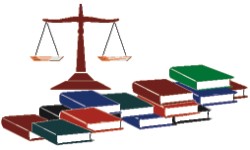Legal Education
Critical approach to legal study: The phases and fusion(s)
M A Sayeed, Saifuz Zaman
This is a two part story; first part was published in previous issue.
 |
Photo: uslawbooks |
This process of furnishing suggestion connected by “reasoned conviction” relates intrinsically to the idea of legal interpretation. Passing the phase of legal analysis alongside factual analysis involves the learners to carefully read the legislation and logically work to understand the hidden assumption of it. Thus at this stage, it may be unnecessary to talk of the development of interpretative capacity in addition to or in isolation from the required thesis of these two phases.
For the purpose of critical legal learning, it will rather be important to emphasize another independent phase which we would call “micro-issue analysis.” Using it as a slightly modified taxonomy, we practically envision the cultivation of “interpretative ethics” into the essence of legal learning. The jurisprudential discourse of interpretative ethics differs virtually from the mere interpretative technique (which we think to be exercised in the previous two phases) in view of the fact that the former takes us a long way beyond the discipline of law, legal method and studying law.
“The life of law has not been logic; it has been experience”-says the great judge, Oliver W. Holmes. It is since the truth, legal education cannot be confined to address the theoretical or logical study of law alone. Practical life is much more complicated than the theoretical orientation of law in society and state. Thus in addition to mere logical study, the critical legal education requires another dimension, that is, the “reflection” of legal knowledge to the fragmented contexts of real life dynamics. By subjecting the learning to analysis based on comparing it with the experience of practice, the critical learners should go for micro-issue analysis.
The micro-issue analysis, which we would like to use as a corollary concept of interpretative ethics, is the final, and perhaps the more crucial phase of critical legal learning. “Law has long been thought worth studying”, as Cotterrell goes to say, “for its intrinsic philosophic or social interest and importance, which relates to but extends beyond its immediate instrumental value or professional relevance.” (The Politics of Jurisprudence, p, 1-2) Here the point lies that the legal learners should critically address micro-issue relating to the law as an institution, evaluating law in the light of reforming goals, underpinning ideologies and prevailing attitude towards legal philosophy.
The micro-issue analysis requires the learners always asking the sociological, moral or religious contention in regard to particular legal relation. At this phase, the critical legal learners thus need to be aware of the diversity of values and behavior. In addition, they need to be capable of envisioning alternative and more productive ways of organizing the legal thoughts in order to make them fit with current notions of social reality. The appreciation of unfolding political narratives, what Brookfield described as “becoming politically literate” (Developing Critical Thinkers, 1987, p, 14) must also come under the concern of critical legal learners.
Law's interaction with morals, religion, justice and ethics is thought to be concentrated in this phase. Thus it provides an “infinite enterprise” for the law students to go for searching the truth of legal text in the time. Going beyond the linguistic (text-based) approach, the critical learner should seek to develop new ways of reading law in a “democracy and right-oriented genre.” Or in other words, they should always search for a “normative coherence to explain how laws interact, in pursuit of the key to reasoning.” This lesson will serve the major purpose of micro-issue analysis by keeping its faith with the spirit of interpretative ethics.
In concluding this write-up, we will now turn into a more radical consideration by examining what critical approach to legal learning actually offers for the learners. In the foregoing discussion, we have identified three interlocking phases legal analysis, factual analysis and the micro-issue analysis as vital to develop critical approach to the legal study. It is almost clear that by passing through all these phases, the learners of law will be supposed not to confine his understanding only within the sphere of particular law and legal assumption; they will rather need to wander into the infinite structure of the legal enterprise as a whole.
Putting the study of law at the focal point, the critical approach to legal study offers a “peripheral prospect/project” on the way of looking at the law. It [critical legal learning] is therefore, not a misnomer so far as it matters more as an analytical attitudean attitude of how we should determine the dream of law in the dominion of lifeor an attitude of how we should think of law and life alike
Law being the medium of social construction requires its learners to continue what Roscoe Pound calls “efficacious social engineering” (Introduction to the Philosophy of Law, 47) On the other hand, law being the artefact (what Hegel wants to see) requires the learners' reflection on the sense of humanity and modern rationality. So the learning of law should naturally be complexas complex as understanding the layers Sophocles' Oedipus; should it be necessarily mysterious as mysterious as searching for the “holy grail.”
In reality such complexity or mystery cannot, however, create a “roadblock in the run way” of legal education. There is, of course, a hope which Sharon Hanson makes us recall:
“Legal study and intellectual discipline come with a cost. It is often a costly struggle to reach a place of understanding. However, to demonstrate a good level of competency in legal study is within the grasp of everyone.” ENDED.
The writers are studying law at the University of Dhaka.